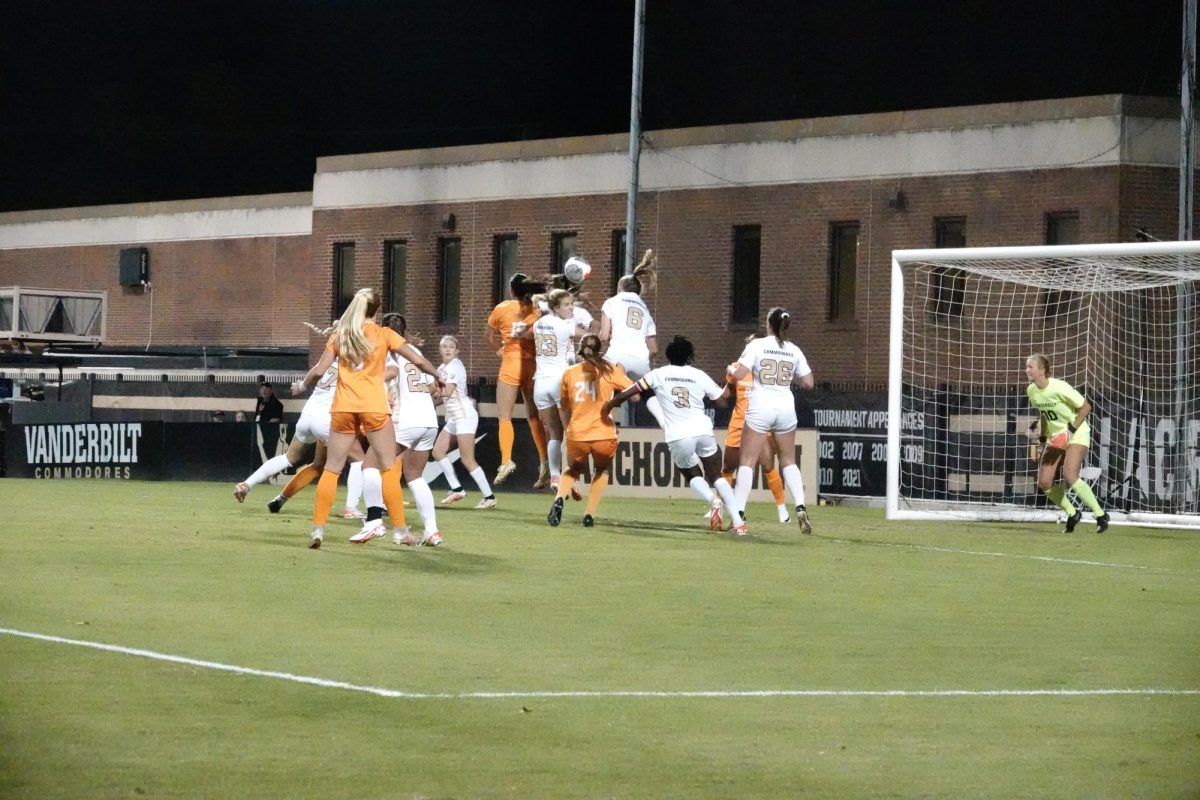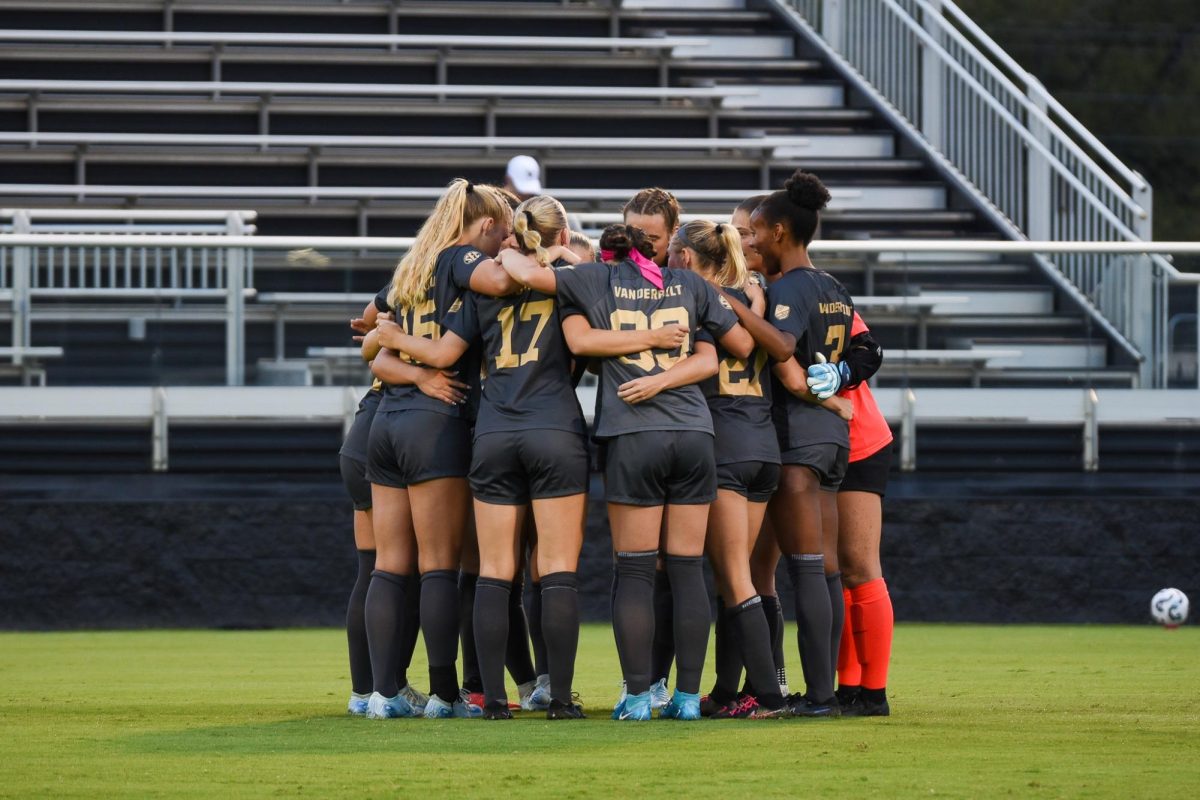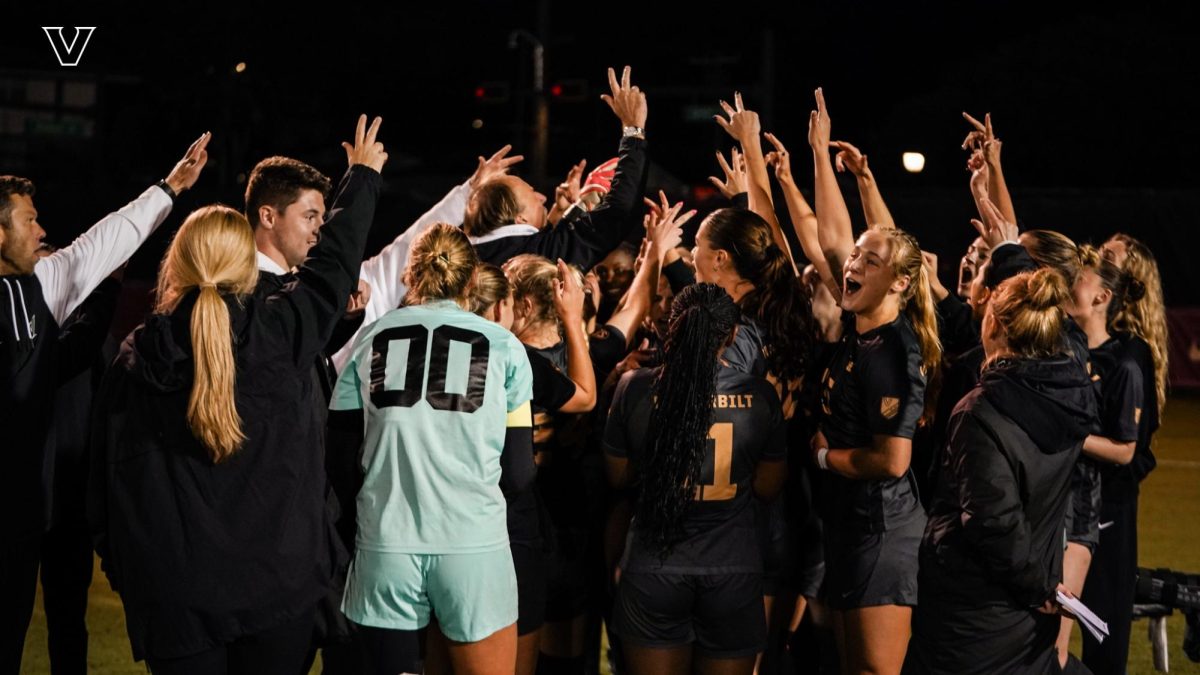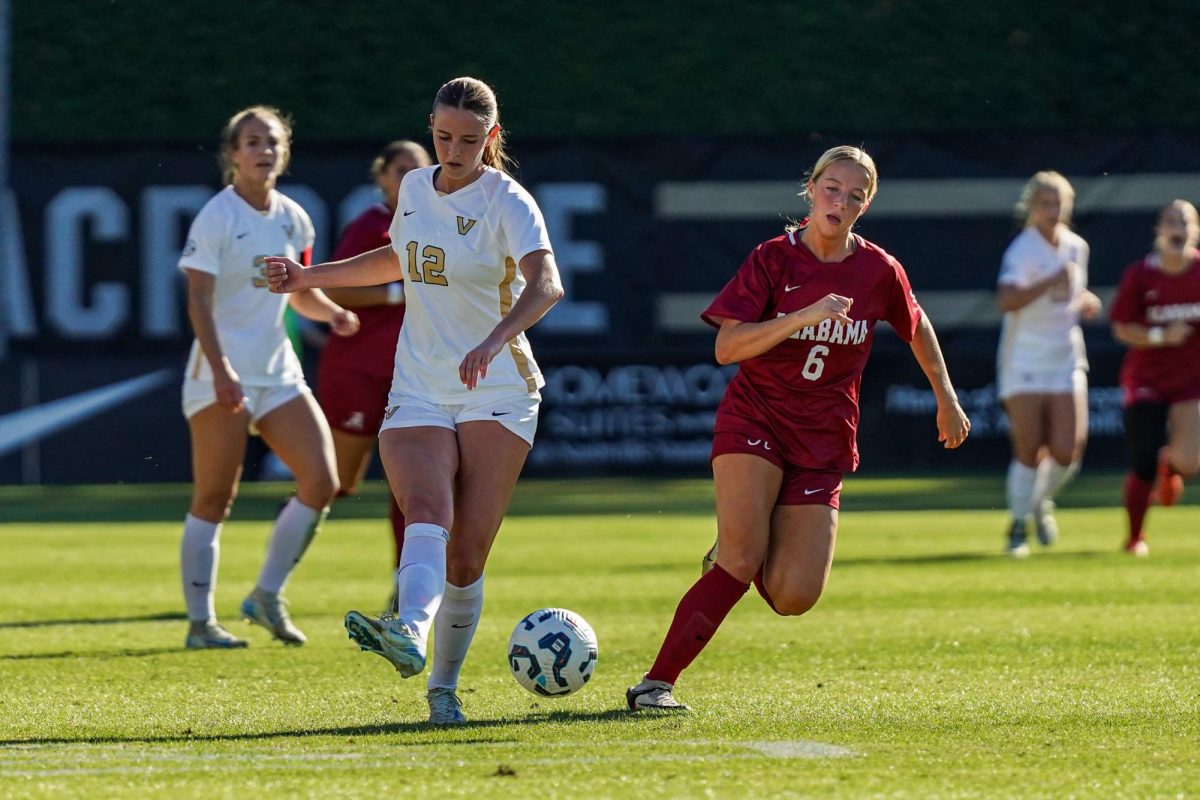This week, 10 teams are competing in the SEC Soccer Championship in Pensacola, Fla. For the first time since head coach Darren Ambrose took over before the 2015 season, Vanderbilt is not one of them. The Commodores missed the cut on tiebreakers between themselves and LSU based on having a worse record against the teams’ common opponents.
It’s undeniably a massive letdown, especially in the way it happened. All Vanderbilt needed to do on the last day was beat Tennessee ― a team below them in the standings ― at home to make it to Pensacola. By halftime, the Commodores knew that even the 0-0 draw that was already on the scoreboard would have been good enough based on results elsewhere. Instead, the Commodores lost 1-0 and the season ended that night. It was a crushing blow that left many of Vanderbilt’s players in tears.
Now, however, the Commodores must turn the page. In order to get past the devastation of last Thursday night and get stronger as a program, Vanderbilt must reflect on how it got to this point and what it needs to improve for 2024. In particular, Vanderbilt had two major deficiencies that will need to be addressed: The Commodores’ inability to create chances and score goals with consistency and their poor record in away games.
With that in mind, I’d like to try to answer three questions about this season: Why Vanderbilt’s inconsistency was a problem, why the Commodores struggled to create chances, and what will need to be better next year? As a preview, I’m going to end this piece on an earnest note of optimism. Vanderbilt does have the right pieces and the right personnel to gel much better than the program did this fall, and I really think 2024 will be a step up on both 2023 and even prior seasons. So let’s begin:
Why was Vanderbilt’s inconsistency inevitably going to lead to problems?
Despite its issues this fall, Vanderbilt was very close to making the SEC Tournament and the NCAA Tournament. The Commodores should have had a goal in the 38th minute against Tennessee when Ella Eggleston’s header crossed the goal line but was missed by the referee.
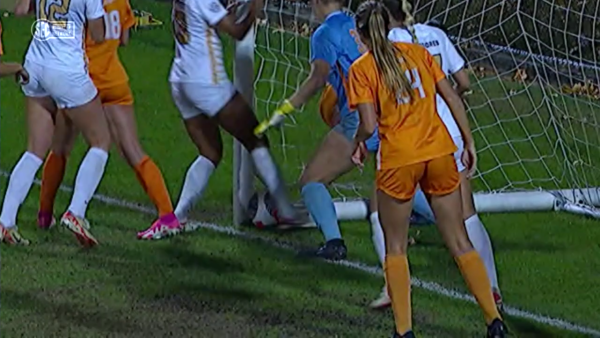
Tennessee’s winner came from a defensive mistake. Vanderbilt conceded a late equalizer against Florida on another fluke goal. The Commodores dominated possession on Sept. 29 against Georgia and conceded on both of the Bulldogs’ first-half shots.
Take away any one of these bad breaks and Vanderbilt is in the SEC Tournament. Take away all of them and Vanderbilt has up to 19 points in the SEC and finishes the season as the No. 3 seed, easily good enough for both a first round bye and an NCAA Tournament selection. Using this math, I’ve only given Vanderbilt five timely breaks or taken them away from their opponents, and I’ve lifted the Commodores up by eight spots in the conference standings. There’s only one problem: Soccer just doesn’t work like that.
While there were plenty of bad or unlucky breaks, there were also several heroic moments for the Commodores without which their record would be even worse. Think of Eggleston’s dramatic 88th-minute header against Missouri, Kate Devine’s incredible saves against Mississippi State or even the wild early-season comeback the Commodores mounted against Northwestern.
In a sport often decided by one goal, teams have to control the game and create their own luck. When we look a little deeper at the statistics, it’s clear that the Commodores didn’t do enough to ensure that a single wondergoal, referee’s call or fluke mistake couldn’t cost them their whole season.
Vanderbilt’s overall offensive numbers weren’t bad, per se. The Commodores ranked third in the SEC with 14 goals scored in conference games. But in the middle of the SEC standings, that figure was only four goals better than 11th-place Auburn. When you add in that six of those goals came in one blowout win over Texas A&M, Vanderbilt’s total number of goals becomes less impressive. Vanderbilt was held to either zero or one goal in 7 of its 10 SEC games, including all five of its road outings.
Combine this with a defense that, while very solid, only ranked sixth in the conference by conceding 12 goals, and you’re left with a team that failed to stick out on either side of the field enough to be securely in the top half of the conference. For a team with ambitious aspirations, Vanderbilt simply didn’t have the consistent creation of chances needed to meet its goals.
Why wasn’t Vanderbilt consistent?
Vanderbilt’s lack of scoring chances came from two combined factors: massive turnover in the front line from 2022 and a style of play that requires a great deal of communication and cooperation.
The Commodores came into 2023 having lost three of its top four scorers from 2022: Raegan Kelley, Alex Kerr and Peyton Cutshall. With Rachel Deresky also having missed the last half of 2022 with an ACL injury, the Commodores were essentially replacing their entire front line. Ambrose had to rotate the team even more than normal in order to find combinations of players that would work together well. Eggleston earned some starts in front, and later on in the season it was Tina Bruni.
Add in Vanderbilt’s intricate style of play and it’s easy to see why a less experienced attack had some growing pains. Some teams in college soccer try to blitz opposing defenses with quick long balls, crush teams in the air or turn the game into a track meet on the wings. Vanderbilt’s tactics are much more patient: The Commodores look to keep possession, look for gaps in the opposing defense and then break through to set up more clear-cut chances.
It’s not an easy style of soccer to play because it takes far more precision and consistency than some more direct styles. One bad pass can spoil the last 10 good ones.
That’s one of the reasons why teams that play that more possession-based style tend to fare better at home than on the road, even at the professional level. A team that feels just a half-step behind for whatever reason ― a long bus ride, lack of familiarity with the field conditions, the crowd, etc. ― will really struggle to maintain that level of precision.
Vanderbilt was 0-4-2 on the road this season, albeit against a brutal road schedule of Kansas, South Carolina, Alabama, Georgia, Kentucky and Mississippi State. All five of Vanderbilt’s SEC road opponents finished in the top half of the conference standings, and three of them ― South Carolina, Alabama and Mississippi State ― are ranked.
The Commodores had good spells of possession in those away games, but were outmatched in far too many areas this season. Vanderbilt was unable to turn those spells into major chances and goals. Vanderbilt’s style was more successful at home where the Commodores got to play on a more familiar field and against a relatively weaker schedule.
There is one more complex stat about Vanderbilt’s attack. For a team that aims to dominate possession, and did so at home, a lot of Vanderbilt’s scoring came from set pieces (corners, free kicks and other dead-ball setups). Out of the eight SEC goals Vanderbilt scored — excluding the Texas A&M game — four came from set pieces and three from corners. For a team that’s not overwhelming in size and has a more possession-based style, that figure stands out as a bit odd.
Of course, having a lot of set-piece goals is a double-edged sword. The bad news is that a team that likes to play free-flowing, open soccer wasn’t scoring a lot from open play. But the good news is that Vanderbilt was drawing a lot of set pieces and making them count. Vanderbilt ranked second in the SEC in corners taken in conference games. You can credit the scoring rate on corners in large part to midfielder Abi Brighton, the primary set-piece taker, who Ambrose called “the heart and soul of this team.” Credit is also due to Eggleston, who scored set-piece goals in several huge moments (not including the one that didn’t count against Tennessee).
With a relatively inexperienced attack, a brutal road schedule and an intricate style of play that requires exceptional communication and precision, Vanderbilt’s play simply wasn’t consistent enough to guarantee the Commodores a postseason spot. With 2023 now in the past, attention must return to the most important question now:
What will Vanderbilt look like in 2024?
This is where I have some good news. I mentioned earlier that Vanderbilt lost three of its four top scorers after 2022. This year, the top four scorers were Deresky, Eggleston, Courtney Jones and Addie Porter. Those four and Brighton were also Vanderbilt’s assist leaders. All four of those players will come back and should be even stronger next year. Deresky — who notched seven goals and four assists — should be fully healthy for her senior season. Eggleston and Jones can build upon very strong freshman years and come back as sophomores with a better understanding of college soccer. The SEC All-Freshman team nominees will look to emerge into a leadership role next season.
Vanderbilt’s biggest losses will come in its midfield and back line. Admittedly, the Commodores will lose a lot of big names in those positions that will need to be replaced for Vanderbilt to have a stronger 2024. Brighton, who earned a second-team All-SEC spot, will leave a big hole behind in the midfield. Senior defender and captain Maya Antoine also made the All-SEC second team, her third straight All-SEC season. Both her presence on the right side of the back line and her leadership qualities will need to be filled in 2024. Amber Nguyen and goalkeeper Devine ― two more rock solid players that have a wealth of experience and have together kept out a lot of goals ― will also be gone.
The class departing now was the last remaining when Vanderbilt won the SEC Tournament in 2020. That class that Ambrose has praised so much will leave a void behind, but it’s one that the younger players should be capable of filling.
While some rebuilding will be necessary at the back line and in the middle of the park, the Commodores have the pieces to come back stronger. The talent is certainly there. There’s a reason that Ambrose has never failed to make the SEC Tournament before this year despite Vanderbilt’s relatively small athletic budget: The system works.
Once the disappointment of this past week subsides, as it should do soon, Vanderbilt will get back to business. That means relearning the system that has made the Commodores so successful in the past. It means finding the sharpness and consistency that can convert possession and passing spells into chances and goals. And it means turning a team that is pretty good on paper into one that is a force to be reckoned with in the toughest conference in the country.

